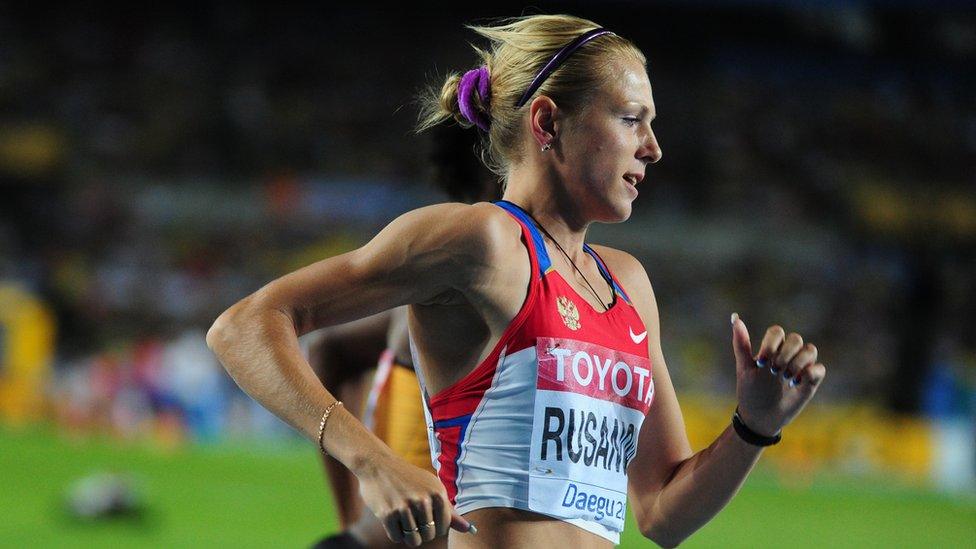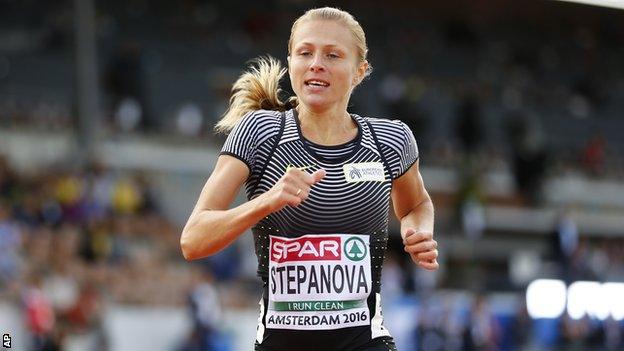100 Women 2016: Russian doping whistleblower gives rare interview
- Published
Yuliya Stepanova talks to the BBC for the 100 Women season about the cheating, cover-ups and life on the run.
The elite Russian athlete Yuliya Stepanova has won worldwide fame - not so much for what she has achieved on the track but what she dared to do off it.
For the past two years she, her husband Vitaly and their three year old son, Robert have been on the run. They live in secret, fearing for their lives, after the couple exposed one of the greatest sporting scandals of all time - Russia's state sponsored doping programme.
In a rare interview at an undisclosed location in the US, Stepanova spoke to BBC 100 Women about the cheating, cover-ups and life on the run.
'I knew it was banned'
Born in the twilight years of the Soviet Union, Stepanova was brought up in Kursk, eight hours drive south west of Moscow. Her childhood, spent on the edge of an industrial estate, was far from idyllic. Her father, who worked in a tyre factory, drank and regularly beat her, her mother and her two sisters.
Athletics was Stepanova's escape. As a teenager she would practise high jumps at the local Victoria Athletics Club. Her first coach, Vera Ivanova, remembers a girl who was "serious and focused", but Stepanova says her father resented the amount of time she devoted to sport. He wanted her to help with digging and planting on the family's vegetable patch.
Stepanova switched from high jumps to middle distance running, and by the age of 20 she had begun to excel, winning regional races. Her performance reached even higher levels when her coach, Vladimir Mokhnev, suggested testosterone injections to help her recover her strength after a serious chest infection.
"I knew it was banned," she says, "but I think my coach prepared me well because he was telling me stories about how it's normal, that's what all athletes do."
Soon she was onto more potent substances, including anabolic steroids which initially made her muscles so stiff she could hardly walk.
Once she was on the Russian national team, Stepanova was sent to Dr Sergei Portugalov, a top sports scientist accused in a 2015 report by the World Anti-Doping Agency of being "very active in the conspiracy to cover up athletes' positive tests in exchange for a percentage of their winnings".
"He told me, 'Don't worry, even if you are tested, you just send me the number of your test results and I'll sort it, so you can sleep soundly'," she says.

But at a race meeting on the River Volga in 2009 she came across one person in the system who wasn't prepared to turn a blind eye. Vitaly Stepanov was an idealistic young officer employed by Rusada, Russia's anti-doping agency.
A dirty athlete and a crusader for clean sport made an unlikely combination. At first she mocked him for his naivety. She told him that all her fellow athletes were doping and that his agency, far from tackling the abuse, often helped to cover it up.
The couple got married just two months after their first date. Despite their differences and frequent rows over Stepanova's continued doping, they stuck together. Eventually, though, she got a two year suspension after irregularities were detected in her biological passport.


What is 100 women?
BBC 100 Women names 100 influential and inspirational women around the world every year. We create documentaries, features and interviews about their lives, giving more space for stories that put women at the centre.
Other stories you might like:
As it happened: The women's takeover of Wikipedia

Stepanova could have kept a low profile, continue to cash her pay cheques and, after the ban, return to the national team. Instead she decided to write a 10-page confession about everything she had done and witnessed. She sent it to the World Anti-Doping Agency, but her letter was ignored, like those that her husband had previously written. She realised she needed more proof.
So she began secretly taping her coaches, her doctor and fellow athletes on her mobile phone.
The recordings, in which several people discuss their use of illegal drugs, were given to a German filmmaker. Before his documentary aired in November 2014, external the Stepanovs fled their country.
The explosive material Stepanova collected set off a chain of investigations which ultimately led to a ban on the entire Russian track and field team from the Rio Olympic Games. While her whistleblowing has earned her praise in much of the world, in Russia many call her a traitor.

Yuliya Stepanova competed in this year's European Championships in Amsterdam but was banned by the IOC from the Rio Games
After a few months in Germany the Stepanovs moved to the US. Not surprisingly she doesn't want me to name the place where I interviewed her.
She now fears for her life and doubts she will ever be able to return home. Her anxiety increased this summer after her electronic account at the World Anti-Doping Agency was hacked revealing her whereabouts and forcing her to move to another location.
Until recently the Stepanovs have had virtually no support or money to help them rebuild their lives. But Yuliya has few regrets.
"I don't consider myself a traitor, I didn't reveal any scientific secrets," she says.
"I simply revealed the shameful truth, which our country doesn't want to confront, and the only reason I told the truth about it all, was to try and put a stop to it."
You can see the documentary, "Life on the Run - the story of Yuliya Stepanova" on BBC World on 31st December/1st January or the BBC News channel on 11th/12th/13th January or catch up on the iPlayer from 14th January.